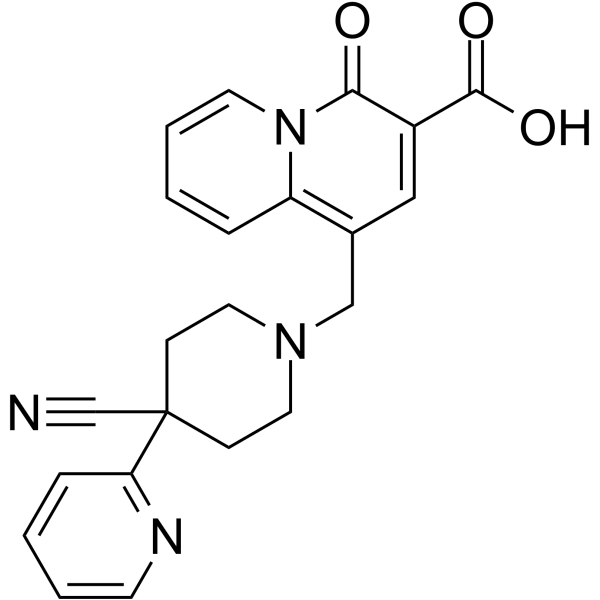
PQCA is a highly selective and potent muscarinic M1 receptor positive allosteric modulator. PQCA has an EC50 value of 49 nM and 135 nM on rhesus and human M1 receptor, respectively. PQCA is inactive for other muscarinic receptors. PQCA has potential to reduce the cognitive deficits associated with Alzheimer's disease.
| Molecular Weight | 388.42 |
| Formula | C22H20N4O3 |
| CAS Number | 1144504-35-7 |
| Form | Solid |
| Solubility (25°C) | DMSO 10 mg/mL (ultrasonic and warming and heat to 60°C) |
| Storage |
Powder -20°C 3 years ; 4°C 2 years In solvent -80°C 6 months ; -20°C 1 month |
| Species | Mouse | Rat | Rabbit | Guinea pig | Hamster | Dog |
| Weight (kg) | 0.02 | 0.15 | 1.8 | 0.4 | 0.08 | 10 |
| Body Surface Area (m2) | 0.007 | 0.025 | 0.15 | 0.05 | 0.02 | 0.5 |
| Km factor | 3 | 6 | 12 | 8 | 5 | 20 |
| Animal A (mg/kg) = Animal B (mg/kg) multiplied by | Animal B Km |
| Animal A Km |
For example, to modify the dose of Compound A used for a mouse (20 mg/kg) to a dose based on the BSA for a rat, multiply 20 mg/kg by the Km factor for a mouse and then divide by the Km factor for a rat. This calculation results in a rat equivalent dose for Compound A of 10 mg/kg.
| Related AChR/AChE Products |
|---|
| Zanapezil
Zanapezil (TAK-147) is a potent, reversible and selective acetylcholine esterase (AChE) inhibitor, it has potent and reversible inhibition of AChE activity in homogenates of the rat cerebral cortex (IC50=51.2 nM). |
| Tacrine
Tacrine is a potent acetylcholinesterse (AChE) inhibitor (IC50=109 nM), also acting as a CYP1A2 substrate agent. |
| THRX-160209
THRX-160209 is a potent antagonist at the M(2) muscarinic acetylcholine (ACh) receptor subtype that was designed using a multivalent strategy, simultaneously targeting the orthosteric site and a nearby site known to bind allosteric ligands. |
| Catestatin
Catestatin is a 21-amino acid residue, cationic and hydrophobic peptide. |
| α-Conotoxin MII
α-Conotoxin MII (α-CTxMII), a 16-amino acid peptide from the venom of the marine snail Conus magus, potently blocks nicotinic acetylcholine receptors (nAChRs) composed of α3β2 subunits, with an IC50 of 0.5 nM. |


Products are for research use only. Not for human use. We do not sell to patients.
© Copyright 2010-2023 AbMole BioScience. All Rights Reserved.
